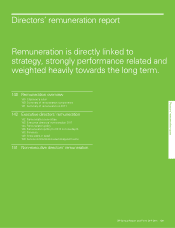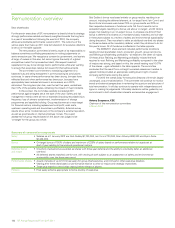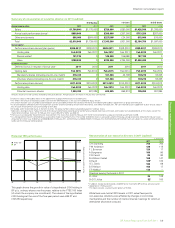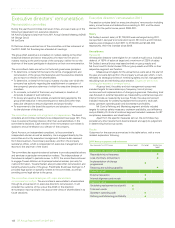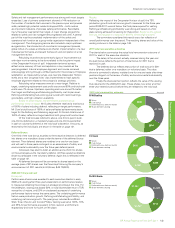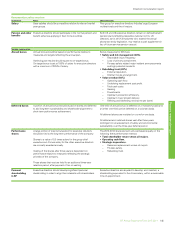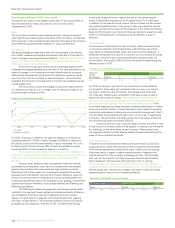BP 2011 Annual Report Download - page 139
Download and view the complete annual report
Please find page 139 of the 2011 BP annual report below. You can navigate through the pages in the report by either clicking on the pages listed below, or by using the keyword search tool below to find specific information within the annual report.
BP Annual Report and Form 20-F 2011 137
Corporate governance
Corporate governance
The Act requires a director of a company who is in any way interested in
a contract or proposed contract with the company to declare the nature
of the director’s interest at a meeting of the directors of the company.
The definition of ‘interest’ includes the interests of spouses, children,
companies and trusts. The Act also requires that a director must avoid a
situation where a director has, or could have, a direct or indirect interest
that conflicts, or possibly may conflict, with the company’s interests. The
Act allows directors of public companies to authorize such conflicts where
appropriate, if a company’s Articles of Association so permit. BP’s Articles
of Association permit the authorization of such conflicts. The directors may
exercise all the powers of the company to borrow money, except that the
amount remaining undischarged of all moneys borrowed by the company
shall not, without approval of the shareholders, exceed the amount paid
up on the share capital plus the aggregate of the amount of the capital and
revenue reserves of the company. Variation of the borrowing power of the
board may only be affected by amending the Articles of Association.
Remuneration of non-executive directors shall be determined in the
aggregate by resolution of the shareholders. Remuneration of executive
directors is determined by the remuneration committee. This committee is
made up of non-executive directors only. There is no requirement of share
ownership for a director’s qualification.
Dividend rights; other rights to share in company profits; capital calls
If recommended by the directors of BP, BP shareholders may, by
resolution, declare dividends but no such dividend may be declared in
excess of the amount recommended by the directors. The directors may
also pay interim dividends without obtaining shareholder approval. No
dividend may be paid other than out of profits available for distribution,
as determined under IFRS and the Act. Dividends on ordinary shares are
payable only after payment of dividends on BP preference shares. Any
dividend unclaimed after a period of 12 years from the date of declaration
of such dividend shall be forfeited and reverts to BP.
The directors have the power to declare and pay dividends in any
currency provided that a sterling equivalent is announced. It is not the
company’s intention to change its current policy of paying dividends in US
dollars.
At the company’s AGM held on 15 April 2010, shareholders
approved the introduction of a Scrip Dividend Programme (Programme) and
to include provisions in the Articles of Association to enable the company
to operate the Programme. The Programme enables ordinary shareholders
and BP ADS holders to elect to receive new fully paid ordinary shares (or
BP ADSs in the case of BP ADS holders) instead of cash. The operation
of the Programme is always subject to the directors’ decision to make
the scrip offer available in respect of any particular dividend. Should the
directors decide not to offer the scrip in respect of any particular dividend,
cash will automatically be paid instead.
Apart from shareholders’ rights to share in BP’s profits by dividend
(if any is declared or announced), the Articles of Association provide that
the directors may set aside:
• A special reserve fund out of the balance of profits each year to make up
any deficit of cumulative dividend on the BP preference shares.
• A general reserve out of the balance of profits each year, which shall
be applicable for any purpose to which the profits of the company
may properly be applied. This may include capitalization of such sum,
pursuant to an ordinary shareholders’ resolution, and distribution to
shareholders as if it were distributed by way of a dividend on the
ordinary shares or in paying up in full unissued ordinary shares for
allotment and distribution as bonus shares.
Any such sums so deposited may be distributed in accordance with the
manner of distribution of dividends as described above.
Holders of shares are not subject to calls on capital by the
company, provided that the amounts required to be paid on issue have
been paid off. All shares are fully paid.
Voting rights
The Articles of Association of the company provide that voting on
resolutions at a shareholders’ meeting will be decided on a poll other than
resolutions of a procedural nature, which may be decided on a show of
hands. If voting is on a poll, every shareholder who is present in person
or by proxy has one vote for every ordinary share held and two votes for
every £5 in nominal amount of BP preference shares held. If voting is
on a show of hands, each shareholder who is present at the meeting in
person or whose duly appointed proxy is present in person will have one
vote, regardless of the number of shares held, unless a poll is requested.
Shareholders do not have cumulative voting rights.
Holders of record of ordinary shares may appoint a proxy, including
a beneficial owner of those shares, to attend, speak and vote on their
behalf at any shareholders’ meeting.
Record holders of BP ADSs are also entitled to attend, speak
and vote at any shareholders’ meeting of BP by the appointment by the
approved depositary, JPMorgan Chase Bank N.A., of them as proxies in
respect of the ordinary shares represented by their ADSs. Each such proxy
may also appoint a proxy. Alternatively, holders of BP ADSs are entitled to
vote by supplying their voting instructions to the depositary, who will vote
the ordinary shares represented by their ADSs in accordance with their
instructions.
Proxies may be delivered electronically.
Matters are transacted at shareholders’ meetings by the proposing
and passing of resolutions, of which there are two types: ordinary or
special. An annual general meeting must be held once in every year.
An ordinary resolution requires the affirmative vote of a majority of
the votes of those persons voting at a meeting at which there is a quorum.
A special resolution requires the affirmative vote of not less than three-
fourths of the persons voting at a meeting at which there is a quorum. Any
AGM requires 21 days’ notice. The notice period for a general meeting is
14 days subject to the company obtaining annual shareholder approval,
failing which, a 21-day notice period will apply.
Liquidation rights; redemption provisions
In the event of a liquidation of BP, after payment of all liabilities and
applicable deductions under UK laws and subject to the payment of
secured creditors, the holders of BP preference shares would be entitled
to the sum of (i) the capital paid up on such shares plus, (ii) accrued and
unpaid dividends and (iii) a premium equal to the higher of (a) 10% of the
capital paid up on the BP preference shares and (b) the excess of the
average market price over par value of such shares on the LSE during the
previous six months. The remaining assets (if any) would be divided pro
rata among the holders of ordinary shares.
Without prejudice to any special rights previously conferred on
the holders of any class of shares, BP may issue any share with such
preferred, deferred or other special rights, or subject to such restrictions as
the shareholders by resolution determine (or, in the absence of any such
resolutions, by determination of the directors), and may issue shares that
are to be or may be redeemed.
Variation of rights
The rights attached to any class of shares may be varied with the consent
in writing of holders of 75% of the shares of that class or on the adoption
of a special resolution passed at a separate meeting of the holders of the
shares of that class. At every such separate meeting, all of the provisions
of the Articles of Association relating to proceedings at a general meeting
apply, except that the quorum with respect to a meeting to change the
rights attached to the preference shares is 10% or more of the shares of
that class, and the quorum to change the rights attached to the ordinary
shares is one-third or more of the shares of that class.














